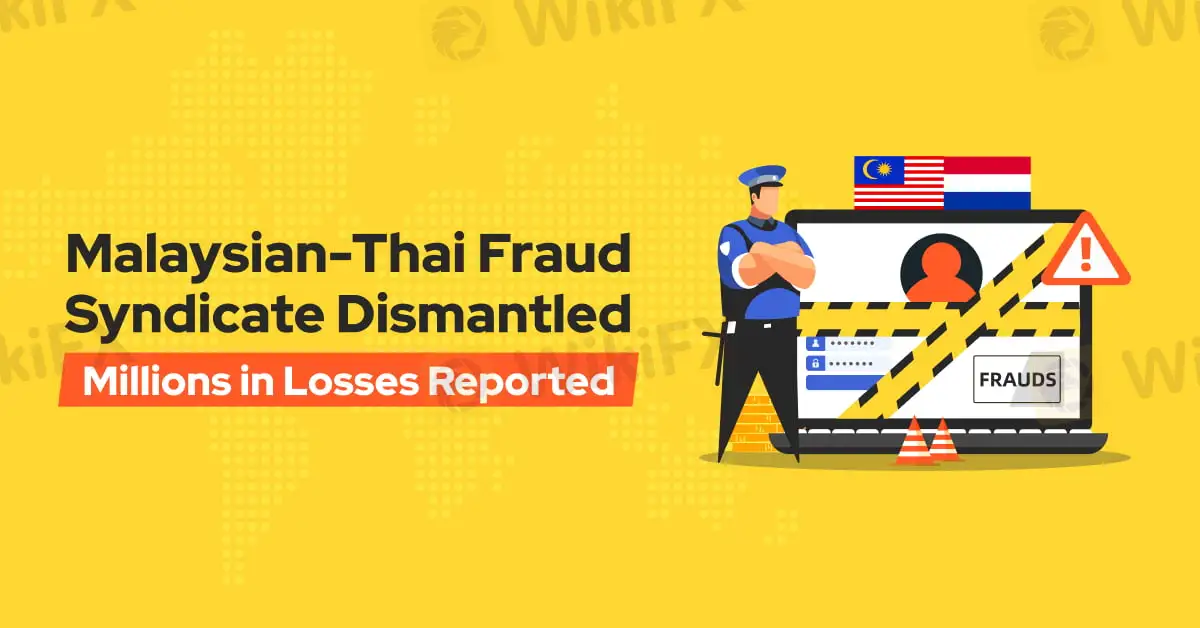简体中文
繁體中文
English
Pусский
日本語
ภาษาไทย
Tiếng Việt
Bahasa Indonesia
Español
हिन्दी
Filippiiniläinen
Français
Deutsch
Português
Türkçe
한국어
العربية
Malaysian-Thai Fraud Syndicate Dismantled, Millions in Losses Reported
Abstract:The Royal Malaysia Police (PDRM) has received 26 reports concerning the Nicshare and CommonApps investment schemes, both linked to a major fraudulent syndicate led by a Malaysian citizen. The syndicate’s activities came to light following the arrest of its leader by Thai authorities on 16 December.

The Royal Malaysia Police (PDRM) has received 26 reports concerning the Nicshare and CommonApps investment schemes, both linked to a major fraudulent syndicate led by a Malaysian citizen. The syndicates activities came to light following the arrest of its leader by Thai authorities on 16 December.
According to Inspector-General of Police (IGP) Tan Sri Razarudin Husain, 24 reports linked to the Nicshare scheme revealed a total loss of RM8,212,758.29, while two reports associated with CommonApps involved losses amounting to RM340,079. Investigations into these reports are currently underway under Section 420 of the Penal Code and the Anti-Money Laundering, Anti-Terrorism Financing, and Proceeds of Unlawful Activities Act 2001.
Authorities have charged several suspects and entities connected to the schemes. The investigation is ongoing, focusing on the networks operations, including links to Malaysian individuals apprehended in Thailand.
Thai police have reported that the arrests were part of efforts to dismantle a large-scale money laundering and fraud syndicate, which allegedly laundered over 5 billion Baht (equivalent to approximately RM651 million). The operation targeted victims who were lured into investing in fraudulent mobile applications like Nicshare and CommonApps with promises of lucrative stock market returns.

The groups leader, a 38-year-old Malaysian man, was detained at the Sadao Immigration Checkpoint in Songkhla province as he attempted to enter Thailand. His Thai wife, believed to be an accomplice, was apprehended two days later at a separate location. Both arrests followed a series of complaints filed by victims who had been deceived into investing in the schemes.
The fraudulent operations allegedly involved manipulating mobile applications to create the illusion of high-profit investments. Victims were misled into believing their funds were being used in legitimate stock market ventures, only to find themselves defrauded.
The public is advised to remain cautious when approached with investment opportunities promising unrealistic returns, particularly those involving unverified mobile applications. Both governments are committed to raising awareness about financial scams to protect citizens from falling prey to such deceptive practices.

To prevent falling victim to fraudulent schemes like this one, using tools like WikiFX can be a game-changer. WikiFX provides detailed information on brokers, including regulatory status, customer reviews, and safety ratings, allowing users to verify the legitimacy of any investment platform before committing their money. With access to in-depth insights and risk alerts, WikiFX equips potential investors with the resources to make informed decisions and avoid unauthorised or unlicensed entities. By checking with WikiFX, users can confidently protect their savings and avoid the costly traps set by unscrupulous investment syndicates.

Disclaimer:
The views in this article only represent the author's personal views, and do not constitute investment advice on this platform. This platform does not guarantee the accuracy, completeness and timeliness of the information in the article, and will not be liable for any loss caused by the use of or reliance on the information in the article.
Read more

Doo Financial Expands Regulatory Reach with Offshore Licenses in BVI and Cayman Islands
According to the report, Doo Group, a prominent Singapore-based online brokerage firm, has strengthened its global presence by securing new offshore licenses for its brokerage brand, Doo Financial. The company recently announced that entities under the Doo Financial umbrella have been granted licenses by two key offshore regulatory bodies: the British Virgin Islands Financial Services Commission (BVI FSC) and the Cayman Islands Monetary Authority (CIMA).

The Hidden Checklist: Five Unconventional Steps to Vet Your Broker
Forex broker scams continue to evolve, employing new tactics to appear credible and mislead unsuspecting traders. Identifying these fraudulent schemes requires vigilance and strategies beyond the usual advice. Here are five effective methods to help traders assess the legitimacy of a forex broker and avoid potential pitfalls.

Doo Financial Obtains Licenses in BVI and Cayman Islands
Doo Financial, a subsidiary of Singapore-based Doo Group, has expanded its regulatory footprint by securing new offshore licenses from the British Virgin Islands Financial Services Commission (BVI FSC) and the Cayman Islands Monetary Authority (CIMA).

CFI’s New Initiative Aims to Promote Transparency in Trading
A new programme has been launched by CFI to address the growing need for transparency and awareness in online trading. Named “Trading Transparency+: Empowering Awareness and Clarity in Trading,” the initiative seeks to combat misinformation and equip individuals with resources to evaluate whether trading aligns with their financial goals and circumstances.
WikiFX Broker
Latest News
ASIC Sues Binance Australia Derivatives for Misclassifying Retail Clients
AIMS Broker Review
The Hidden Checklist: Five Unconventional Steps to Vet Your Broker
WikiFX Review: Is FxPro Reliable?
Malaysian-Thai Fraud Syndicate Dismantled, Millions in Losses Reported
Trading frauds topped the list of scams in India- Report Reveals
YAMARKETS' Jingle Bells Christmas Offer!
Doo Financial Expands Regulatory Reach with Offshore Licenses in BVI and Cayman Islands
Why is there so much exposure against PrimeX Capital?
Russia to Fully Ban Crypto Mining in 10 Regions Starting January 1, 2025
Currency Calculator


